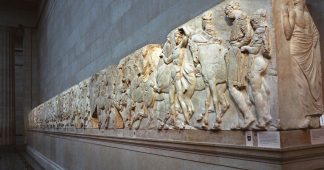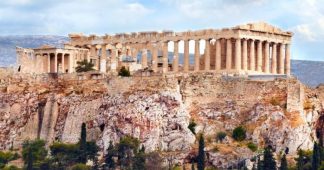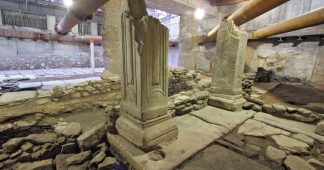December 9, 2020
Greece’s Culture Ministry has submitted an amendment stipulating the export of museum collections including antiquities and even “an entire monument” to museums or “similar places” abroad for a period of up to 50 years. According to the amendment, the collections can be lent for 25 years that can be renewed for another 25. Strong reactions by archaeologists and SYRIZA who speak of “borrowed and never returned antiquities.”
The amendment was tabled to rectify an initial provision for the export for up to one century, 100 years (50+50years) following also strong reactions.
The revised provision stipulates the export of collections to promote Greece’s cultural heritage and if sufficient guarantees are provided for their safe transport, exhibition and return.
Despite the lowering of lending period from 100 years to 50, the reactions remained and there are many who claim that in this way the seizure of the Parthenon sculptures is legalized as they connect this provision with a previous statement by Kyriakos Mitsotakis to UK’s newspaper the Observer. The Prime Minister had asked his British counterpart to send the Parthenons Marbles to Greece, as a loan for a certain period of time and for its part Athens would send “very important objects”, which have never left our country, to be exhibited at the British Museum.
Greek Archaeologists
For the Association of the Greek Archaeologists, the amendment is also a pretext to supply with exhibition items the branch the Benaki Museum plans to open in Melbourne, Australia.
“In the context of good legislative principles, Ministers must not bring photographic provisions to Parliament for a vote. Even more, they must not use specific cases as a cover to support provisions that drastically change the country’s museum policy and even provisions that define what will happen in the next… 100 years!” the Association said in a statement.
“The invocation of extroversion as a justification for the provision is superficial, misleading and a pretext. It has been proven that the large periodical exhibitions organized by the Ministry of Culture around the world, and have become major cultural events, are the main actions of extroversion, promotion of the country, with extensions of cultural diplomacy, without having to resort to long-term borrowing,” the Greek Archaeologists said among others.
SYRIZA
However, both the initial provision and its revision have drawn a reaction from opposition SYRIZA that it is tantamount to the “expatriation” of antiquities in museums to the benefit of museums abroad at the expense of the Greek ones.
During the debate at the Parliament’s committee, SYRIZA MP and ex Education Minister Nikos Filis said that with the current legal framework, an object can be transferred from a museum in Greece to a museum abroad for 5 years and a possible extension of another 5 years. Usually the lending lasts much less and is done on a reciprocal basis, that is similar exhibits from abroad temporarily enrich exhibitions in Greece.
Culture Minister Mendoni initially submitted a law for consultation that it was providing the increase of the duration of the “export” of the object or, now, of “the entire monument” (sic!) for 10 + 10 years, Filis said.
“Already, these 20 years constitute an unjustifiably long period of absence of the object from Greece,” Filis said.
He added that “subsequently, the government submitted the law to the Parliament with the article providing export for 50+50 years and modified it today into 25+25 years!”
Saying that the Culture Minister “goes up and down with the decades as if she was eating popcorn,” he criticized that the amendment foresees the export of the objects not only to foreign museums, but also to “similar places“, whatever this means for the credibility of the institutions that will receive and keep our monuments for such a long time,”
He also warns that in addition to the “expatriation” operation, there are also economic consequences, as “our museums and monuments are among the most important tourist attractions.”
“Are we seriously willing to make other countries and other museums abroad permanent attractions, undermining tourism in our country?” Filis asked.
The Culture Ministry
Following the reactions, the Culture Minister promised to bring legislative improvements to the bill, however, she rejected the criticism.
Lina Mendoni said, among others, that” all provisions of the current archaeological law prevail. The central [arcaeological] council will give its opinion and the law will be fully and strictly implemented.”
She rejected opposition criticism of “the alleged privatization of our cultural heritage,” as she said.
She added that “the government’s legislative initiative aims to utilize and highlight our cultural heritage as a key point in changing the economic model and redefining the country’s identity.” – Whatever the redefinition of Greece’s identity means.
PS If you ever see the Parthenon Marbles in Greece, please, text me. If you also see one day the Acropolis on wheels, alert me
Published at www.keeptalkinggreece.com











